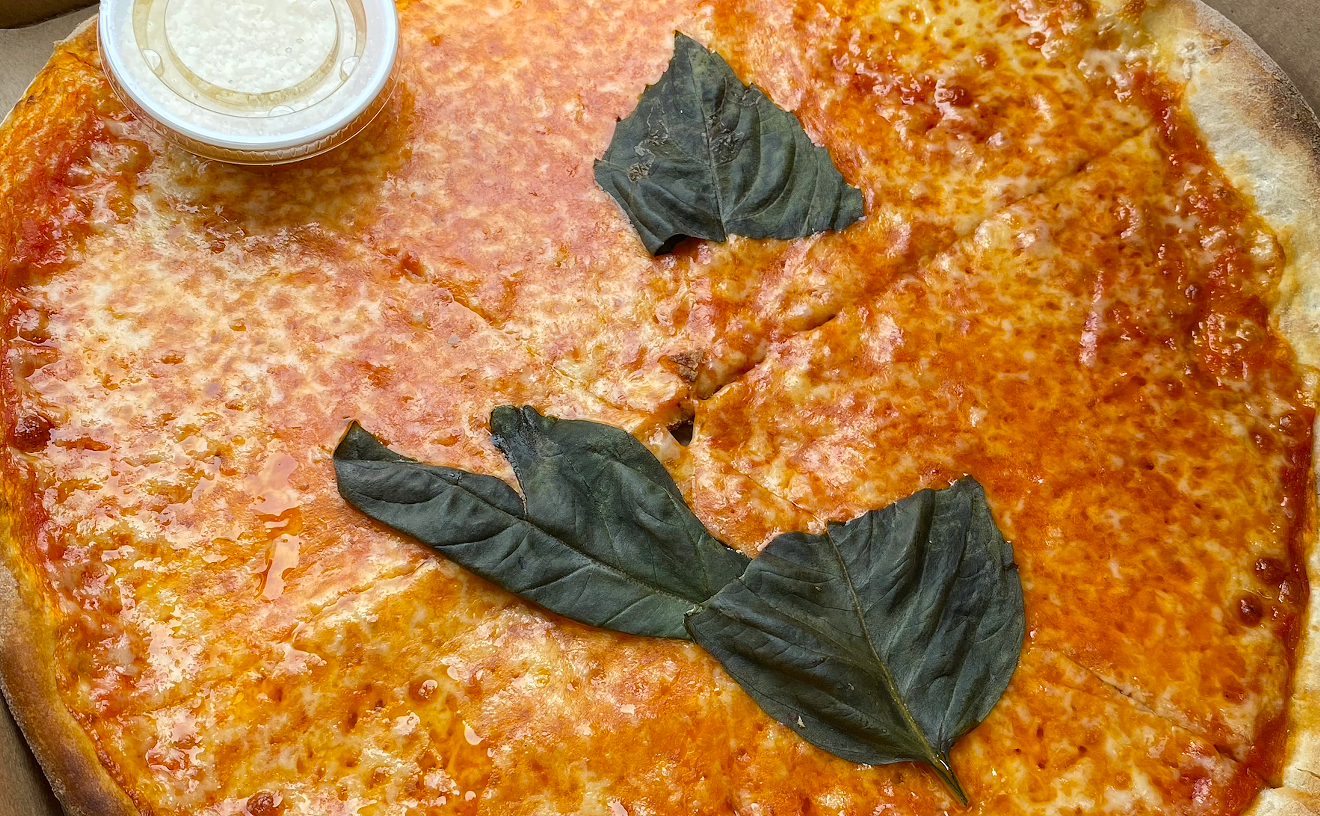I just got back from a trip to Santa Monica, California, a place so foreign to my experience and sensibilities that I felt like Marco Polo encountering the Mongolians. The ways of the Santa Monicans are strange indeed, and wonderful; I came away with a few observations about the natives that I think are worth sharing.
When you make eye contact with a Santa Monican, any stranger passing on the street, she smiles at you. The teeth she displays in that smile are inevitably flecked with green, making her no less beautiful. The Santa Monican owes her glowing complexion, her trim physique, and her happy nature to the raw food and the green leafy vegetables she eats five times a day. People in Santa Monica carry around whole Thai coconuts, sipping out the milk with a straw, in the same way the Uruguayans are never without a gourd full of maté. They carry whole avocados in their backpacks as "snacks." They congregate in raw food cafés like Euphoria Loves Rawvolution on Main Street, where they consume shakes made from maca, goji berries, and agave; eat lunches of hemp seed tabbouleh and coconut jerky sandwiches; and finish off with spirulina cashew pie. When they fall off the raw/vegan wagon, they head over to Le Pain Quotidienne for organic, free-range, soft-boiled eggs with rustic, homemade, multigrain toast; or to Urth Caffé for a cup of fair-trade, shade-grown, organic, sustainable, fair-wage cappuccino with organic raw milk (raw milk and cheese are legal in California, as are pot brownies... but that's another story). If they cook at home, they've got ingredients from the Wednesday/Saturday organic greenmarket that range from tiny, wild frais du bois and sweet dried plums to basketball-sized artichokes; from Meyer lemons to weedy greens like lambs quarters, all grown to locavore standards. Between meals, of course, they're in yoga class.
Santa Monicans are always in some phase of detox. You wouldn't think these heavenly bodies would have accumulated many poisons on such a rigorously nutritious diet, but cleanse they do: Everyone is either beginning, in the middle of, or just off a regimen of liver, colon, or kidney flushing. Frank and enthusiastic discussion of the state of one's internal organs, bowel movements, and gas production is considered a fair topic of polite discourse. Restaurants have adapted by offering menus of juices, nectars, broths, and elixirs; they've hired mixologists who are part-shaman, part-nutritionist, part-psychologist, part-chef.
I'd be inclined to make merry with all this if I hadn't run across a brilliant lecture by Mark Bittman, the food guy at the New York Times, posted on Ted.com. Bittman basically summarizes the research of culinary ethicists like Michael Pollen (The Omnivore's Dilemma), Eric Schlosser (Fast Food Nation), Marion Nestle (Food Politics; Safe Food), and others, but he does so within the TED construct: 18 minutes to give the "talk of your life." Bittman speaks as if his and our lives depended upon it, beginning with a series of startling facts. "After energy production, livestock is the second-highest contributor to atmosphere-altering gasses. Nearly one-fifth of all greenhouse gas is generated by livestock production..." Methane is 20 times more poisonous than CO2... half the antibiotics produced in this country are administered not to people but to animals... Livestock production in the U.S. contributes to land degradation, water pollution, water shortages, loss of biodiversity... 10 billion animals a year are slaughtered to feed us... Thirty percent of Earth's land surface is directly or indirectly devoted to raising the animals we eat, and this percentage is predicted to double in the next 40 years.
And the kicker: "Our demand for meat, dairy, and processed carbohydrates drives us to consume way more calories than are good for us; and those calories are in foods that cause, not prevent, disease. The evidence is very clear that plants promote health."
Scoff at the rawists, the vegans, the locavores, the bunny-huggers, but the evidence of our own eyes and the warnings of researchers, physicians, and social scientists are building to a crashing crescendo. Fifty percent of American children will be overweight or obese by 2010 (that's two years away, folks), and this is no matter of mere aesthetics. With childhood obesity comes a slew of diseases: diabetes, heart disease, high blood pressure, high cholesterol. That's half of all kids in the U.S. whose parents may well outlive them. We're raising the sickest generation in history.
Serious nutritionists tell us that for optimum health, we need eat no more than half a pound of animal flesh a week. Most of us consume that much in a day. Clearly, we need more options locally if we want to cut our meat intake in half, which seems the least we can do. But there's not a raw food café on every corner here — the only place I know of with a committed raw menu is Soma Café in Lake Worth, where they serve a changing roster of raw pâtés (spinach, Mexican, curried carrot tahini, no-bean hummus with veggies and raw flax crackers, $9.50) all of them delicious; an entrée that might include pad Thai, Mediterranean lettuce wraps, portobello delight ($11.75), a sprouted walnut pâté-stuffed tomato ($7.50), and a "dark chocolate mousse pie" ($6) made with avocado, coconut oil, agave, and cocoa powder on a sprouted walnut and dried coconut crust. Plus 20 variations on the smoothie. And if you're willing to expand past raw, Soma serves an herbed almond quinoa spread ($7) that's out of this world; homemade granola with organic yogurt ($5.50); bowls of buckwheat groats, roast turkey and tuna salad sandwiches, and an olive tapénade roll-up with organic spinach and garden vegetables.
For gourmet dinners, of course, we have Sublime in Fort Lauderdale, a restaurant founded by animal-rights activist Nanci Alexander and serving an entirely vegan, and partly organic, menu that's finally living up to its name. The place has always been beautiful, with its water wall and open brick oven and its inventive list of "healthy" cocktails and organic wines, but until last week, I'd never had a good meal there. I couldn't figure out why even a vegan would want to eat seitan or anything made with soy cheese when almost every cuisine on Earth offers better vegetarian dishes as an afterthought, using real food: ratatouille, for instance, or vegetable fried rice or samosas or couscous. Sublime has had its share of woes over the years — unworkable partnerships and hurricanes have closed it temporarily from time to time. But after my last dinner there, I wanted to get up and dance on the table — I was frankly ecstatic. I'd rate what we ate as one of my top five meals this year, and that includes haute, chichi edibles at some of the best restaurants in the country.
Sublime's cauliflower "frito misto" is a good example of what they can get up to ($12), an appetizer that runs right across the full spectrum of flavors, sensations, and textures: tempura battered cauliflower florets tossed in a sweet, hot chili sauce made with chili flakes, garlic, paprika, sugar, and vinegar boiled down to the consistency of maple syrup, garnished with roasted sesame seeds and tiny curls of green onion. The dish looks beautiful, it tastes divine, and it fills all your nooks and crannies with pleasure. A gorgeous sublime roll ($10, from the "sushi" menu) comes wrapped in grasshopper-green soy paper with avocado, scallions, and cucumber inside and pools of lemon "aioli" (a soy mayonnaise) for dipping. Carrot ginger soup ($7) combines sweet, bracing flavors that shake your taste buds awake. Everything tastes as fresh and bright as if chef Seth Kirschbaum had just plucked them from the garden. And these are just the starters.
You can order a classic margarita pizza ($12) from the wood-burning oven with either a white or whole-wheat crust (I recommend the white) or one with pesto, soy cheese, and tomatoes ($14) or one topped with fake "caviar" (made from sea vegetable), chives, and crème fraîche ($40); our pesto pizza was marvelous and could totally go crust-to-crust with the best brick-oven pizzas in South Florida. A braised spinach, wood-fired artichoke, and roasted shallot "quiche" ($16) lacking either eggs or cream was the biggest knockout — how the hell do you make a pie this creamy and rich without animal fat? With tofu? You've got to be kidding! It came with the most delicate green beans tossed in olive oil, garnished with long chives and leaves of fresh parsley, and a glistening pile of roasted red-bliss potatoes.
The presentation of everything was exquisite. Chocolate nirvana cake ($11), made with both cocoa and that bane of '70s hippiedom, carob, ran circles around most chocolate desserts — except for the soy whipped cream — which was the only soy-based pseudo-food that didn't win me over. It still tasted like soy milk.
Broward and Palm Beach are still challenged: We don't have anywhere near the range of vegetarian, organic, raw, and vegan restaurants we need or the number of greenmarkets, CSAs, and whole food outlets. It's frankly still a chore to try to eat healthy at even our best restaurants, but some are starting to offer organic, local, and seasonal produce. South Florida chefs and restaurateurs ought to get with the program and take it seriously: They have the opportunity to be leaders here. I'm with Bittman: We need to jump on this bandwagon and hang on for our lives if our kids are going to live in a world we'd even faintly recognize — if, for that matter, they live to see it at all.










